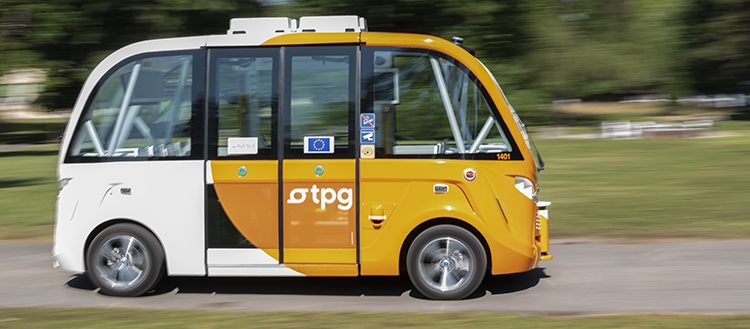The European consortium ULTIMO, in which UNIGE participates, will test an autonomous and on-demand public transport service in three European cities, including Geneva.

The ULTIMO consortium will build on the results of the AVENUE study (image), conducted between 2018 and 2022 by the UNIGE on the site of the Belle-Idée Hospital (GE). It will deploy an autonomous shuttle service in three pilot cities in Europe. © Olivier Zimmermann
Travelling the route of your choice 24 hours a day: autonomous public transport services - without drivers or other staff on board - have many advantages. But there are still major obstacles to their widespread deployment. Building on the work of the H2020 AVENUE consortium, which ran from 2018 to 2022, a new European consortium, in which the University of Geneva (UNIGE) is actively involved, is taking the next step: the Horizon Europe ULTIMO project will develop an automated minibus service in three test cities in Europe, including Geneva. The project will have a total budget of 55 million euros over four years, 16 million of which will be financed by the Swiss Confederation and 24 million by the European Commission.
From 2025 - and for one year - fifteen driverless electric minibuses will be deployed in Geneva, within a perimeter yet to be defined. These shuttles for about 15 people will provide routes on demand 24 hours a day. This pilot project, led by the European consortium ULTIMO, in which the UNIGE is participating, aims to set up a full-scale autonomous public transport network, offering a door-to-door service. It will build on the promising results of the AVENUE project, which was led by UNIGE between 2018 and 2022 and conducted at eight test sites in Europe, including the Geneva Belle-Idée Hospital, attached to the Geneva University Hospitals (HUG), and Meyrin.
''The aim of AVENUE was to study the technical and economic feasibility of an automated on-demand transport service as well as the potential psychological obstacles to its use. ULTIMO's goal will be to develop a real business model that addresses the concrete economic, legal and security issues of such a service,'' explains Dimitri Konstantas, full professor and director of the Information Science Institute of the Geneva School of Economics (GSEM) at the UNIGE, associate coordinator and technical director of ULTIMO.
This European consortium brings together twenty-three partners from eight European countries. Among them are eight Swiss partners: the University of Geneva (UNIGE), Geneva Public Transport (tpg), the State of Geneva, the start-up MobileThinking Sarl, the companies ArgYou SA and ZF-CV SA, and the associations Open Geneva and SAAM. Led by Deutsche Bahn AG with a budget of 55 million euros over four years - 24 million from the European Commission and 16 million from the Swiss Confederation, the rest of the funding will be provided by the various industrial partners - the consortium will deploy its activities in two test cities in addition to Geneva: Kronach (Germany) and Oslo (Norway). A total of 45 vehicles will be deployed.
Practical answers to complex issues
ULTIMO will first focus on solving very concrete problems: how to ensure the safety of passengers and react, for example, in the event of accidents or incivilities in these unmanned shuttles? What prices should be set for tickets when the routes are on demand? What minimum and maximum distances should be set for the destinations served? How to adapt the legal framework, which currently does not allow automated buses to travel at more than 30km/h? Not forgetting the challenges of standardising the modelling of the territory, so that it is compatible with the guidance systems of as many vehicles as possible, and thus optimising technical costs.
The second part of the project (2025-2026) will be dedicated to the implementation of the autonomous transport service in the field. In Geneva, several types of shuttles will be deployed to test the compatibility of the systems. As a partner from the outset, the tpg has specified its objective: ''In parallel with the day-to-day management of mobility in the Geneva conurbation, we are thinking about the public transport of the future,'' says Denis Berdoz, Director General of the tpg. ''We are convinced that the autonomous vehicle will play a growing role in traffic in the long term. This ambitious project should enable us to acquire the knowledge that is essential for understanding the future.''
For his part, Serge Dal Busco, State Councillor of the Republic and Canton of Geneva in charge of the Department of Infrastructure, notes that ''it is an opportunity for the canton of Geneva and for the tpg to take part in this avant-garde international project, which can usefully renew and broaden the public transport offer in the context of the profound changes that our mobility will undergo in the years to come.''
The widespread introduction of autonomous public transport would have many advantages. ''By offering door-to-door, on-demand, 24-hour transport, the service would be of higher quality. It would also avoid empty trips during off-peak hours and thus reduce some costs. Finally, by responding to demand in real time, queuing and congestion around stations could be avoided. This is a real paradigm shift in public transport,'' concludes Dimitri Konstantas.






